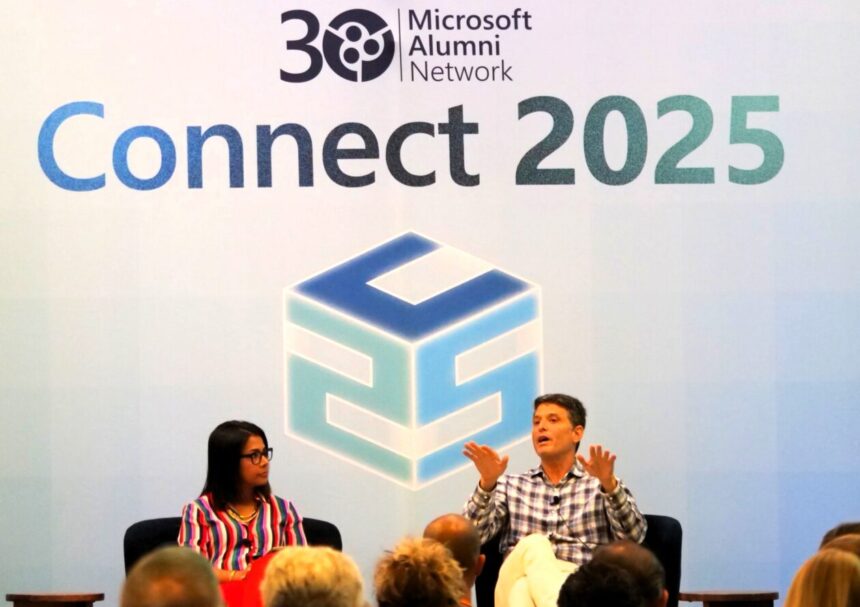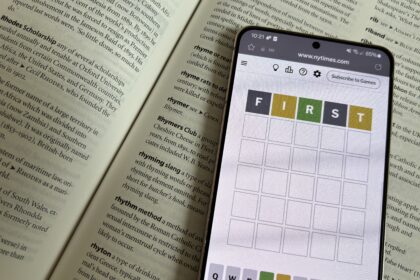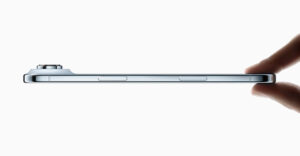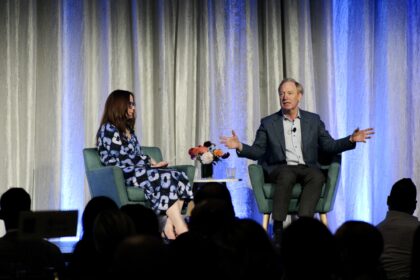REDMOND, Wash. — AI will transform healthcare in the next 1-2 years by connecting directly to personal medical records to give patients new levels of health insights.
That was one of the key predictions from a session with former Microsoft executive Terry Myerson and current Microsoft Health & Life Sciences leader Mary Varghese Presti on Tuesday morning at the Microsoft Alumni Network Connect 2025 conference in Redmond.
People will be able to connect their personal medical records to AI and “have a conversation that includes all of the knowledge of the published literature,” predicted Myerson, a former Microsoft Windows and Exchange leader who is now CEO of Seattle-area health data technology company Truveta.
For example, Myerson said, when faced with a decision about a surgery, a patient could use the technology to understand the potential outcomes based on data from other people with similar profiles.
“I think a lot of things are going to change,” Myerson said. “That empowerment of the individual just seems so righteous to me. … I think that’s single-digit years away.”
Varghese Presti said she shared that optimism, explaining that while the healthcare industry has tried to solve its data challenges for many years, today’s artificial intelligence models finally make that transformation possible.
“Where I do get optimistic is that the AI models these days are ubiquitous. They’re accessible. They’re making really non-linear improvements in terms of what’s possible,” she said.
However, both speakers acknowledged the immense challenges created by the structural complexity of healthcare.
Varghese Presti drew a sharp contrast with other sectors: “In every other industry, the value chain is super clean. In healthcare, it’s so discombobulated.” With health systems operating on thin margins, she said, any new technology must have an ROI that is “so obvious, because they don’t have a lot of money.”
Myerson credited Apple for making real progress in giving people access to their personal medical records on their phones. He said the company has been funding lobbying, creating the necessary APIs, and pressuring API providers to make health data more accessible through its Apple Health app.
Myerson said that Truveta’s platform provides a crucial missing piece: data on actual patient outcomes. He explained that the company was founded to address the critical data shortages exposed during the pandemic by creating a massive dataset for research.
Truveta works with its healthcare system partners to gather clinical data from the medical records of roughly one in three Americans. This data, he said, is completely de-identified to protect patient privacy before it is used to help fill critical knowledge gaps in patient care.
Varghese Presti, who has spent 30 years in healthcare, joined Microsoft through the acquisition of Nuance Communications, which included the well-known Dragon Medical speech-to-text software. The idea is to give physicians a chance to have more natural, face-to-face interactions with patients.
Microsoft has expanded this as part of the Dragon Copilot, an ambient AI that listens to the doctor-patient conversation, intelligently filters the dialogue, and automatically creates the clinical notes by the end of the visit. Microsoft is now expanding this AI technology to help bedside nurses.
Myerson said Microsoft has an advantage over rivals in at least one respect: it is not a direct competitor to the healthcare systems it serves. He contrasted the Redmond company in this way with Google, which is often seen as a consumer company, and Amazon, which is viewed as a direct healthcare competitor through Amazon One Medical and other initiatives.
GeekWire is a media partner of the Microsoft Alumni Network Connect 2025 conference.
Read the full article here










